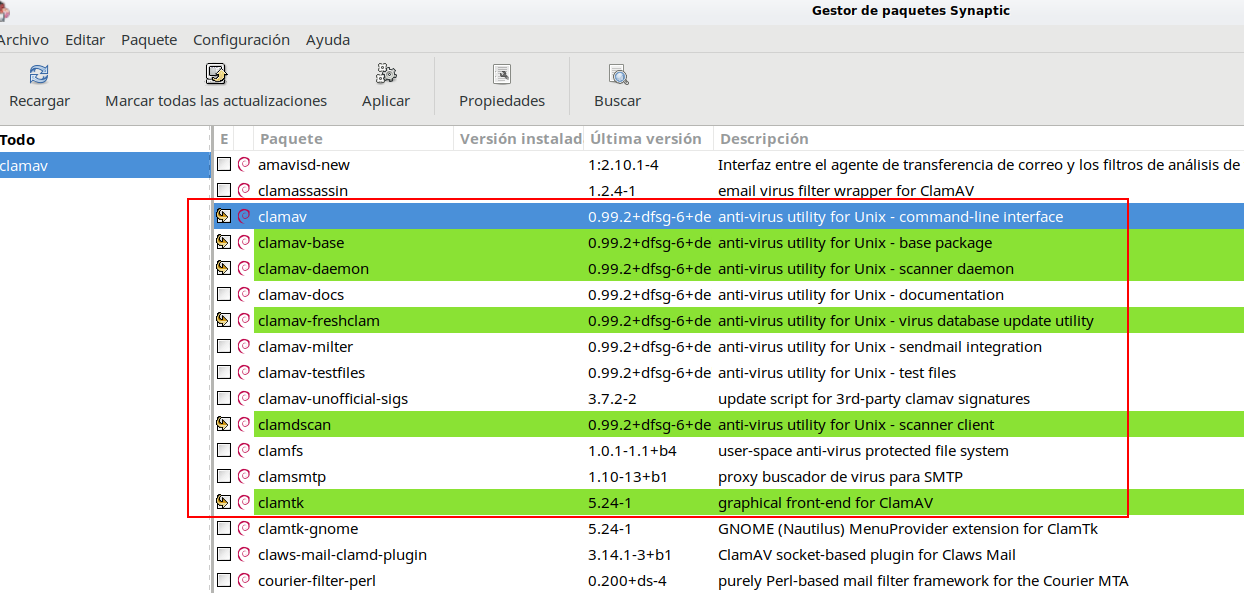ClamAV is an open source (GPL) antivirus engine designed for detecting Trojans, viruses, malware and other malicious threats.
Today’s plan is to install and configure ClamAV software to perform automatic daily system scans and send emails when malware is detected.
Install ClamAV
Vcswatch reports that the current version of the package is not in its VCS. Either you need to push your commits and/or your tags, or the information about the package's VCS are out of date. A common cause of the latter issue when using the Git VCS is not specifying the correct branch when the packaging is not in the default one (remote HEAD branch), which is usually 'master' but can be. ClamAV is a virus scanner for Linux/Unix like systems. This tutorial will show you how to install it and how to set it up to auto-update and do a daily scan. It will only report if threats are found.
$ sudo apt-get install clamav-daemonwill install the ClamAV daemon and the 'clamdscan' cli client. Other.nix systems can do the equivalent from their respective package manager or install from source. Mac users should be able to something equivalent with homebrew. The service is called clamav-daemon.service.Start it and enable it to start at boot. Testing the software. In order to make sure ClamAV and the definitions are installed correctly, scan the EICAR test file (a harmless signature with no virus code) with clamscan. I have stopped and disabled the clamav-daemon and clamav-freshclam services. The following commands have been used to stop and disable them from running at bootime: service clamav-daemon stop; service clamav-freshclam stop; update-rc.d -f clamav-daemon remove; update-rc.d -f clamav-freshclam remove.
On Debian/Ubuntu, do:
On CentOS, do:
On Debian, start ClamAV virus database updater if it wasn’t started automatically:
Or alternatively do:
The above commands will start freshclam in a daemon mode:
By default, freshclam will look for new updates every hour:
Note that we can always update ClamAV manually by typing the following command:
Install SSMTP
To be able to send email, we’ll need something simple, something like SSMTP.
On Debian/Ubuntu, do:
On CentOS, do:
Open the configuration file:
Change the following settings appropriately (make sure the details are correct):
SSMTP configuration file contains our email login details, therefore it’s a good practice to restrict access for regular users:
Test if we are able to send an email:
All looks good so far.
Create the Daily Scan Script
We will create a new directory to store script files:
Now open a new file for the script:
And add the following code:
Save the file. Make sure it’s executable:
Clamav Daemon Machina
You can get the most recent version of the script from GitHub (you need to have git installed):
Add Script to Cron.daily

Now when we have the script, we want it to be automatically executed every day.
This can be easily achieved by creating a daily cron job. It is assumed that the system is online 24/7 (server in this case) or at least most of the time. Otherwise anacron might be a better choice.
Let’s create a hard link as below:
Check to make sure that the hard link was created:
How Good Is Clamav
There is one main advantage of creating a hard link instead of a symbolic link in my particular case.
I tend to keep all custom scripts in one place for the sake of convenience and they sometimes get renamed. I usually don’t have time to walk around fixing all broken symlinks.
Nevertheless, there are quite a few other alternatives available:
- Create a symbolic link.
- Move the script file to
cron.dailyfolder. - Use crontab for script execution.
You should always choose what suits you best in one or another situation.
Troubleshoting
Clamav Download For Windows 10
If you get the following error:
Update the database manually:
ClamAV
Clamav Daemon Machine
Clam AntiVirus (ClamAV) is a free and open source, cross platform antivirus toolkit able to detect many types of malicious software, including viruses. One of its main uses is on mail servers as a server-side email virus scanner. The application was developed for Unix and has third party versions available for AIX, BSD, HP-UX, Linux, OS X, OpenVMS, OSF (Tru64) and Solaris.

As of version 0.97.5, ClamAV builds and runs on Microsoft Windows. Both ClamAV and its updates are made available free of charge.
Clamav Daemon Mac Download

ClamAV is a powerful AntiVirus scanner focused towards integration with mail servers for attachment scanning. It provides a flexible and scalable multi-threaded daemon, a command line scanner, and a tool for automatic updating via the Internet.
Clam AntiVirus is based on a shared library distributed with the Clam AntiVirus package, which you can use with your own software. Most importantly, the virus database is kept up to date. The project was acquired by Sourcefire in 2007
Clamav Windows Download
ClamAV includes a number of utilities: a command-line scanner, automatic database updater and a scalable multi-threaded daemon, running on an anti-virus engine from a shared library.
Clamav For Linux
The application also features a Milter interface for sendmail and on-demand scanning. It has support for Zip, RAR, Tar, Gzip, Bzip2, OLE2, Cabinet, CHM, BinHex, SIS formats, most mail file formats, ELF executables and Portable Executable (PE) files compressed with UPX, FSG, Petite, NsPack, wwpack32, MEW, Upack and obfuscated with SUE, Y0da Cryptor. It also supports many document formats, including Microsoft Office, HTML, Rich Text Format (RTF) and Portable Document Format (PDF).